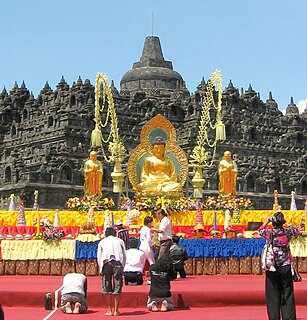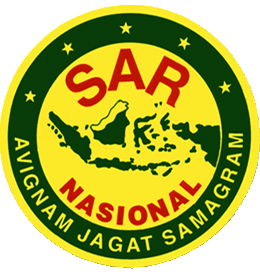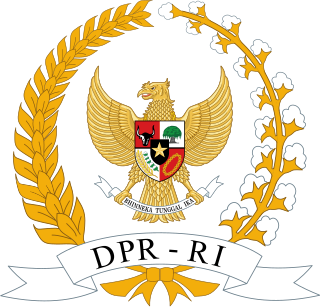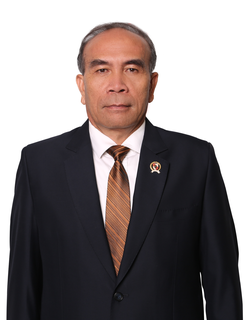
The Indonesian National Armed Forces are the military forces of the Republic of Indonesia. It consists of the Army (TNI-AD), Navy (TNI-AL), and Air Force (TNI-AU). The President of Indonesia is the commander-in-chief of the Armed Forces. In 2016, it comprises approximately 395,500 military personnel including the Indonesian Marine Corps, which is a branch of the Navy.

The following table indicates declared Indonesian government national holidays. Cultural variants also provide opportunity for holidays tied to local events. Beside official holidays, there are the so-called "libur bersama" or "cuti bersama", or joint leave(s) declared nationwide by the government. In total there are 16 public holidays every year.

Badan Intelijen Negara, commonly referred to as BIN, is Indonesia's primary intelligence agency. Prior to 2001, it was known as Bakin ; its name was changed as part of a general restructuring of the agency. BIN is responsible both for co-ordinating information sharing and operations between Indonesia's other intelligence agencies and for mounting operations on its own.

Law enforcement in Indonesia is mainly performed by the Indonesian National Police (POLRI), together with other law enforcement agencies which are under the command of a certain ministry or State-owned company (BUMN) which perform policing duties for a certain public service, these law enforcement agencies are under supervision and are trained by the Indonesian National Police. The Indonesian National Police is basically the national civilian police force of the country responsible for enforcing law and order of the state.

The Language Development and Fostering Agency, formerly Language and Book Development Agency and Language Centre is the institution responsible for standardising and regulating the Indonesian language as well as maintaining the indigenous languages of Indonesia. It is an agency under the Ministry of Education, Culture, Research and Technology of the Republic of Indonesia.

The National Search and Rescue Agency is a government agency of Indonesia. Its head office is in Kemayoran, Central Jakarta, Jakarta.

The Ministry of Defense of the Republic of Indonesia, formerly the Department of Defense of the Republic of Indonesia is a government ministry responsible for the defense affairs of Indonesia. The currently-appointed minister is Prabowo Subianto replacing Ryamizard Ryacudu in 23 October 2019.

Ministry of Research and Technology of the Republic of Indonesia was a government ministry that has the task of conducting affairs in the field of research, science and technology to assist the President of Indonesia in carrying out state. The ministry was formerly known as the Ministry of Research, Technology and Higher Education of the Republic of Indonesia.

The Indonesian Maritime Security Agency is a maritime patrol and rescue agency of the Republic of Indonesia. Bakamla is a non-ministerial government institution which reports directly to the President through Coordinating Ministry for Political, Legal, and Security Affairs. Bakamla's duty is to conduct security and safety patrols in the territorial waters of Indonesia and the jurisdiction of Indonesia. Previously Bakamla was a non-structural institution called the Coordinating Agency for the Security of the Republic of Indonesia. The agency is not part or associated with the Indonesian National Armed Forces, although its top-ranking leadership are handpicked from the Indonesian Navy. Bakamla and the Indonesian Navy, however, often conduct exercises and joint-operation together. While during search-and-rescue operations, Bakamla also conduct joint-operations with the National Search and Rescue Agency.

The Chief of the Indonesian National Police, commonly known as the National Police Chief is the official who heads the Indonesian National Police (Polri).

The speaker of the People's Representative Council of Indonesia, commonly known as the speaker of the People's Representative Council, is the presiding officer of the People's Representative Council of Indonesia. The speaker is the political and parliamentary leader of the People's Representative Council and is simultaneously the Council's presiding officer. The speakers also perform various other administrative and procedural functions.

The Ministry of National Development Planning or National Development Planning Agency is a ministry of the Republic of Indonesia that has the task to oversee government affairs in the field of national development planning to assist the President in organizing state government. The minister is responsible to the President. The Ministry of National Development Planning uses organizational units and resources within the National Development Planning Agency.

The Ministry of Villages, Development of Disadvantaged Regions, and Transmigration is a government ministry in charge for assisting the President in regards to developing the rural and disadvantages areas in Indonesia. Through its community development, is would help to speed up the development of villages. It also the responsibility to in the Transmigration Program.

The Ministry of Education, Culture, Research, and Technology is a new government ministry resulted from fusion of Ministry of Education and Culture and Ministry of Research and Technology. As the name suggest, the ministry is responsible for managing education, cultural, research, and technology affairs within the Indonesian government.

The Ministry of Investment is a new government ministry formed by the Indonesian government in 2021. The ministry responsible for investment affairs and facilitating easiness of investment in Indonesia.

The National Research and Innovation Agency is a cabinet-level government agency formed by Indonesian government in 2019. Originally a new agency attached to Ministry of Research and Technology and leading to formation of Ministry of Research and Technology/National Research and Innovation Agency, the agency controversially separated and made into a new non-ministerial government agency directly under the President of Indonesia in 28 April 2021. On 24 August 2021 the agency gained the cabinet level status officially thru enactment of Presidential Decree No. 78/2021.

The Pancasila Ideology Development Agency is a non-ministerial government agency formed by the Indonesian government in 2018 with Presidential Decree No.7/2018. The agency was tasked with the main task of preserving Pancasila, the state ideology, and its ideological development and implementation. It is the revitalisation of Presidential Unit of Pancasila Ideology Development formed in 2017.

Lieutenant General TNI (Ret.) Hinsa Siburian is an Indonesian government official and former soldier. He currently served as Chief of National Cyber and Crypto Agency since 21 May 2019, replacing Major General TNI (Ret.) Dr. Djoko Setiadi.




















